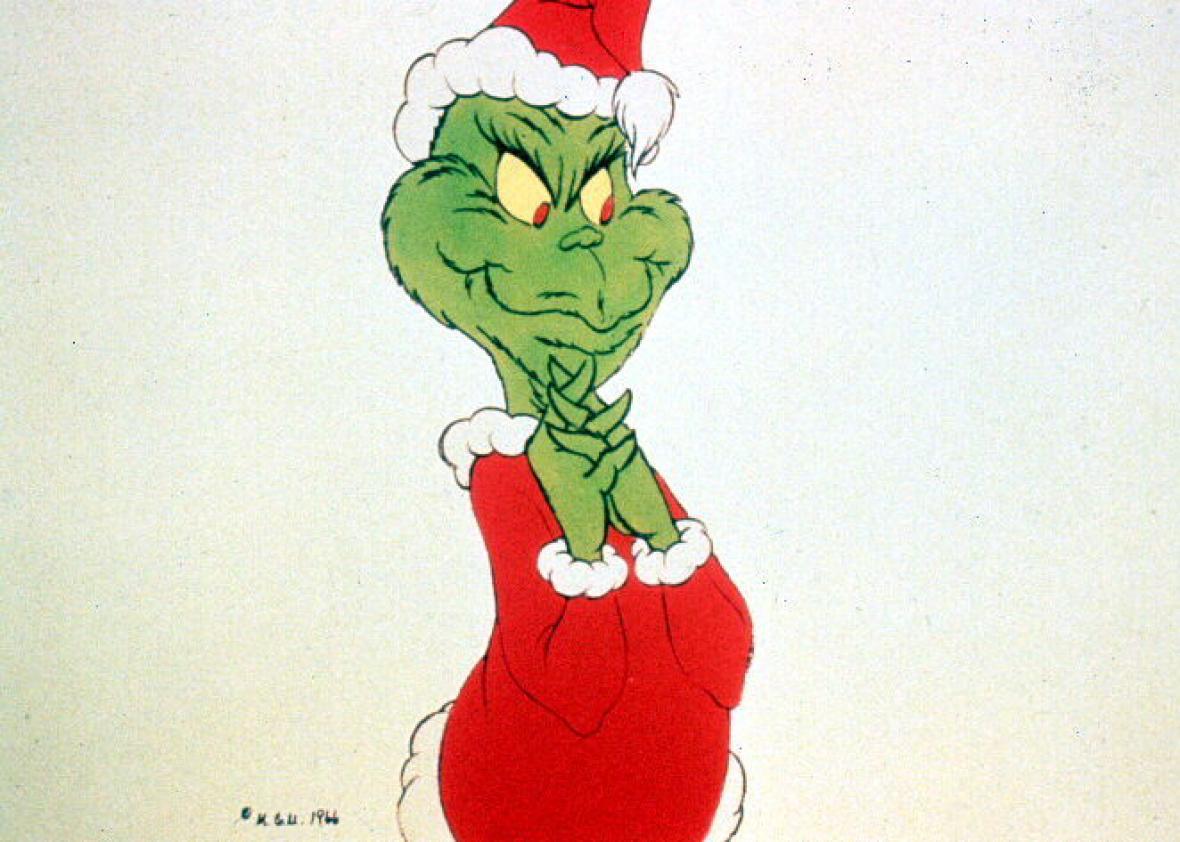There are several grounds on which you can make a straight-faced argument that the 1966 animated feature How the Grinch Stole Christmas! is superior to the classic Dr. Seuss volume from which it is adapted. In the feature, directed by veteran animator Chuck Jones, the Grinch is green, a more appropriate shade for Seuss’s archvillain than the wan white of the book. In the feature, the inimitable Boris Karloff narrates, bringing a sonorous spookiness to the affair that only the most theatrical of parent-readers can hope to approximate. Seuss, who co-produced the special (he is credited as Ted Geisel), finagled a generous budget and put it to good use. The animation both captures the author’s iconic style and improves upon it: Witness the Grinch slithering around the Whos’ Christmas trees like a devilish serpent in the garden or the plaintive, fourth wall–breaking looks from Max, the Grinch’s dog and unwilling accomplice. But the strongest case for the feature’s superiority is the musical number at its two-sizes-too-small heart, “You’re a Mean One, Mr. Grinch.” It is easily the strangest, funniest Christmas song ever composed, a delightfully nasty number that could cut the treacle of a dozen sappy standards if only it got more radio play.
The song takes the form of an apostrophe to the Grinch, an attempt to capture the depths of his cruelty in increasingly elaborate metaphor. Geisel himself composed the lyrics (the music is by Albert Hague), and there’s an unmistakable Seussian whimsy at play in the words. “Your brain is full of spiders, you have garlic in your soul, Mr. Grinch,” goes an early verse. “I wouldn’t touch you with a 39-and-a-half foot pole!”
The ridiculous specificity of the pole’s length—that’s the Seuss we know. What ultimately makes the song so enjoyable, however, are the ways in which it differs from the familiar voice of the author. “You’re a Mean One” is Dr. Seuss after he’s seen his last patient for the day; it’s Ted Geisel a few martinis in, bowtie undone. As the song kicks into gear, its insults begin to sound less like the gentle anarchy of The Cat in the Hat or the pastel pablum of Oh, the Places You’ll Go! than something J.J. Hunsecker might have said about Sidney Falco in Sweet Smell of Success:
You’re a crooked jerky jockey, and you drive a crooked hoss, Mr. Grinch,
You’re a three-decker sauerkraut and toadstool sandwich—with arsenic sauce!
With each verse, the descriptions of the miserable Grinch grow more ornate. His smile is full of termites; he has “all the tender sweetness of a seasick crocodile.” By the song’s conclusion, Seuss is pouring in bile by the half-gallon:
You’re a rotter, Mr. Grinch,
You’re the king of sinful sots,
Your heart’s a dead tomato splotched with moldy purple spots, Mr. Grinch.
Your soul is an appalling dump heap overflowing with the most disgraceful
assortment of deplorable rubbish imaginable mangled up in tangled-up knots!
The overflowing stanza neatly mimics the Grinch’s at-capacity dump heap of a soul—but would it work as song? It might not have, had Seuss not lined up the ideal man to sing it. Thurl Ravenscroft was an actor who, thanks to the same flourishing of postwar consumerism that How the Grinch Stole Christmas! critiques, had infiltrated the homes of millions of Americans. Or his voice had, if not his name. Ravenscroft was the voice of Tony the Tiger, the man who for decades attested to the gr-r-reeatness of Kellogg’s Frosted Flakes. Here, by contrast, he was asked to use his basso profondo to relentlessly malign, and he seems to have relished the opportunity to throw off the shackles of the shill. Ravenscroft luxuriates in the sarcasm of Seuss’s lyrics, switching easily between singing and declaiming, depending on the demands of the line:
[Singing] Your heart is full of unwashed socks, your soul is full of gunk, Mr. Grinch.
[Declaiming] The three words that best describe you are as follows, and I quote: “Stink, stank
[Singing, again, with brio] stunk! “
Such is the thankless nature of voice work that even your best performance can go unrecognized. The Grinch special failed to credit Ravenscroft as the performer when the special aired on CBS, leaving viewers to assume it had been Karloff, the narrator, who also belted out the tune.
It’s a shame that Ravenscroft didn’t receive all the accolades he deserved for turning Seuss’s lyrics into this rousing exercise in derision. And while “You’re a Mean One” has its admirers, it’s a shame it doesn’t have a more prominent place in the popular Christmas songbook. Seuss’s brilliant stroke in writing How the Grinch Stole Christmas! was the realization that the holiday season had plenty of heroes—what it needed was a proper villain. And there’s no better paean to the season’s biggest stinker than this greasy black banana peel of a song.
Update, Dec. 23, 2016: An earlier draft of this article was originally posted in error. The text has been updated to reflect the final version.
